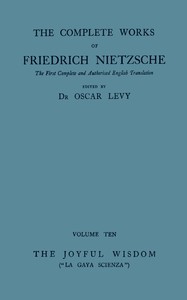The Joyful Wisdom ("La Gaya Scienza") by Friedrich Wilhelm Nietzsche
"The Joyful Wisdom" ("La Gaya Scienza") by Friedrich Wilhelm Nietzsche is a philosophical work written in the late 19th century. This text presents Nietzsche's exploration of themes surrounding existence, the nature of humanity, and the role of laughter and joy in the human experience. It serves as a bridge between his earlier works and the more famous "Thus Spoke Zarathustra," capturing his evolving thoughts on morality, knowledge, and the essence of life
itself. The opening of "The Joyful Wisdom" sets the stage for a rich philosophical investigation into the complexities of existence. Nietzsche begins by reflecting on humanity's constant struggle for survival and meaning, arguing that even the perceived "evils" of human nature can contribute positively to the conservation of the species. He critiques established morals and values, suggesting they often serve to obscure the chaotic and instinctual aspects of human life. Furthermore, Nietzsche introduces the concept of "joyful wisdom," positing that a transformative laughter, one rooted in understanding life's absurdities, is integral to personal and collective growth. Ultimately, this introduction hints at Nietzsche's belief in the power of the individual to shape their own understanding of existence amid its inherent contradictions and challenges. (This is an automatically generated summary.)
Read or download for free
| How to read | Url | Size | |||
|---|---|---|---|---|---|
| Read now! | https://www.gutenberg.org/ebooks/52881.html.images | 613 kB | |||
| EPUB3 (E-readers incl. Send-to-Kindle) | https://www.gutenberg.org/ebooks/52881.epub3.images | 338 kB | |||
| EPUB (older E-readers) | https://www.gutenberg.org/ebooks/52881.epub.images | 340 kB | |||
| EPUB (no images, older E-readers) | https://www.gutenberg.org/ebooks/52881.epub.noimages | 321 kB | |||
| Kindle | https://www.gutenberg.org/ebooks/52881.kf8.images | 695 kB | |||
| older Kindles | https://www.gutenberg.org/ebooks/52881.kindle.images | 462 kB | |||
| Plain Text UTF-8 | https://www.gutenberg.org/ebooks/52881.txt.utf-8 | 554 kB | |||
| Download HTML (zip) | https://www.gutenberg.org/cache/epub/52881/pg52881-h.zip | 287 kB | |||
| There may be more files related to this item. | |||||
Similar Books
About this eBook
| Author | Nietzsche, Friedrich Wilhelm, 1844-1900 |
|---|---|
| Editor | Levy, Oscar, 1867-1946 |
| Translator | Cohn, Paul V. (Paul Victor) |
| Translator | Common, Thomas, 1850-1919 |
| Translator | Petre, Maude Dominica, 1863-1942 |
| Uniform Title | Fröhliche Wissenschaft. English |
| Title | The Joyful Wisdom ("La Gaya Scienza") |
| Note | Reading ease score: 52.8 (10th to 12th grade). Somewhat difficult to read. |
| Credits |
Produced by Thierry Alberto, readbueno and the Online Distributed Proofreading Team at http://www.pgdp.net |
| Language | English |
| LoC Class | B: Philosophy, Psychology, Religion |
| Subject | Philosophy |
| Category | Text |
| EBook-No. | 52881 |
| Release Date | Aug 23, 2016 |
| Copyright Status | Public domain in the USA. |
| Downloads | 2029 downloads in the last 30 days. |
| Project Gutenberg eBooks are always free! | |

